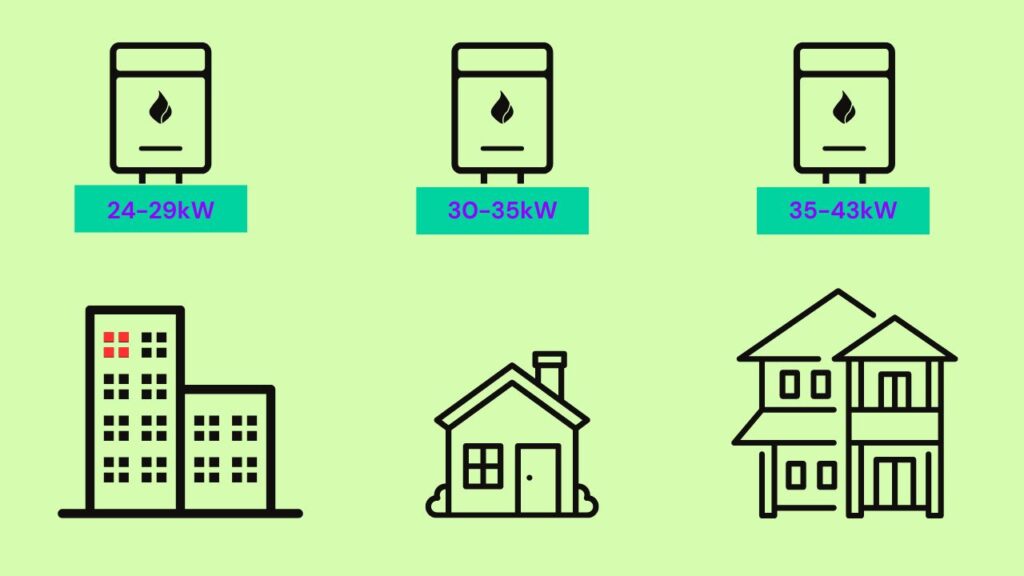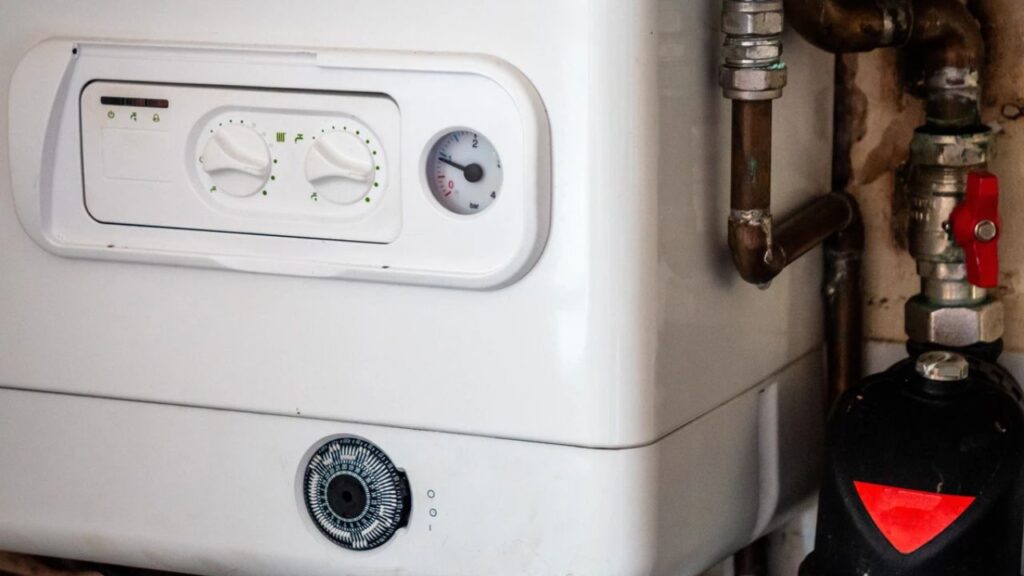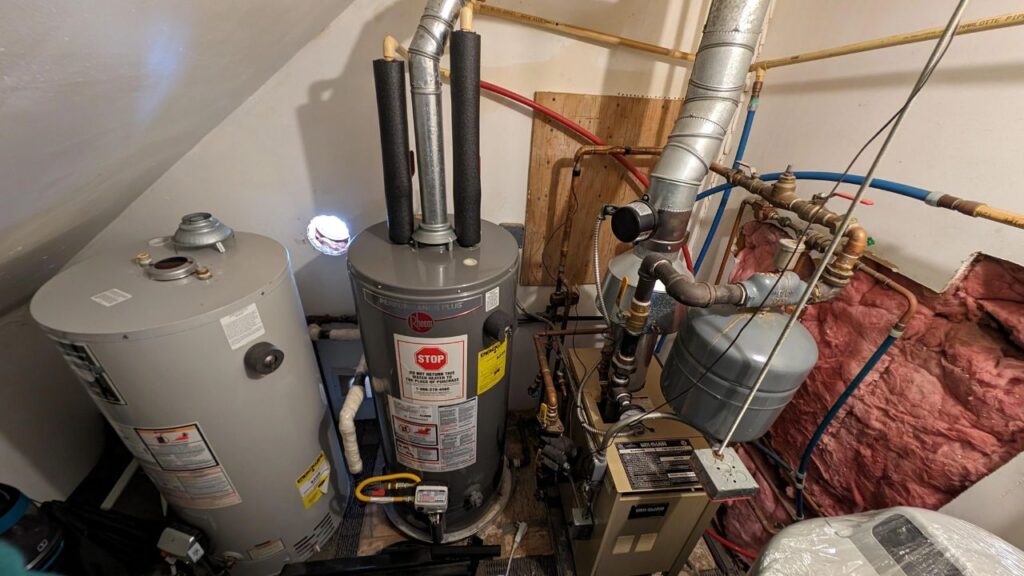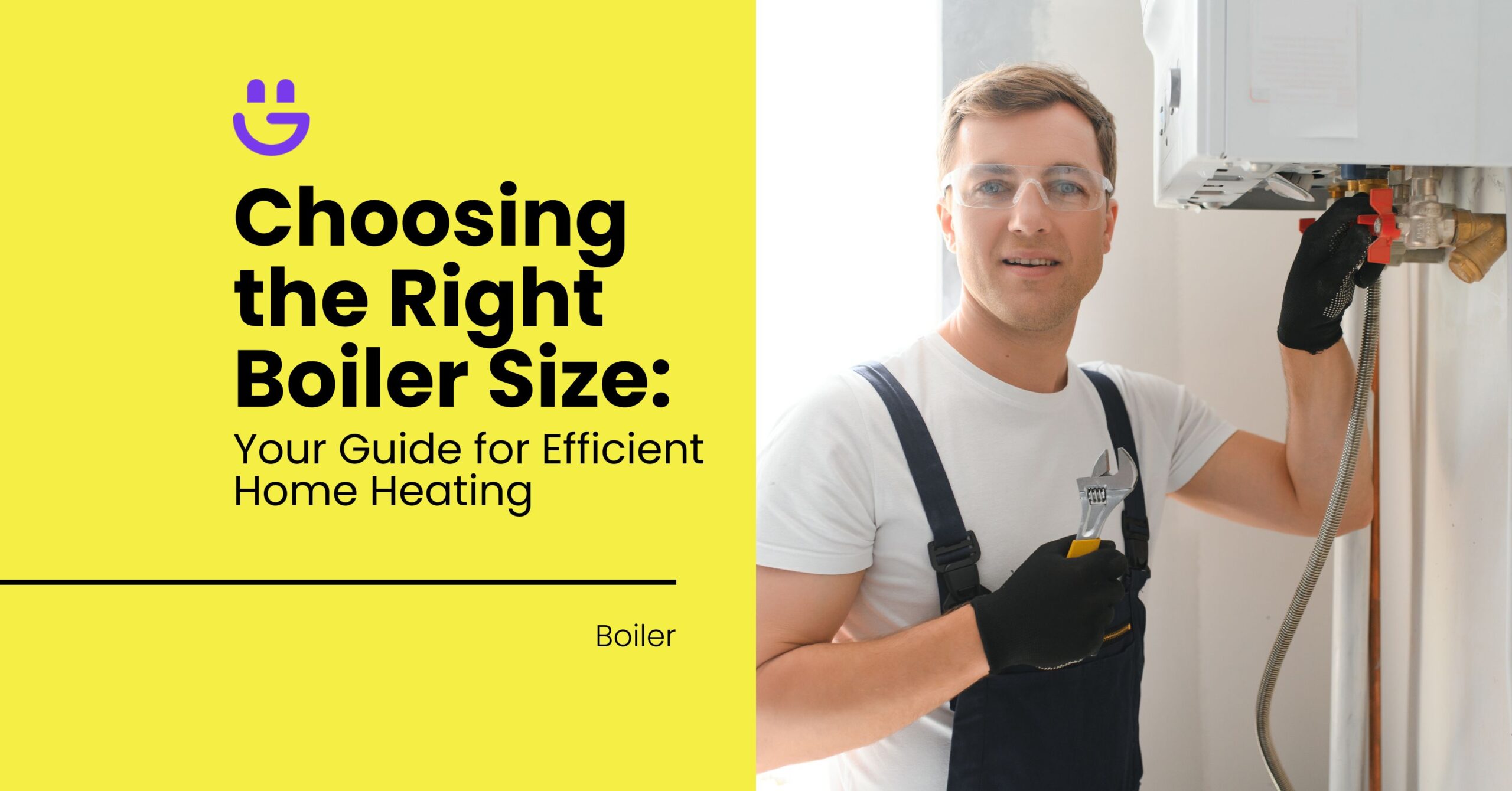Last Updated on January 15, 2025
The size of the boiler you need for your home will depend on numerous factors, including the size of your home, your hot water demands and the number of occupants in the house.
If your boiler is too big, it will lead to unnecessarily high energy bills; too small and it won’t provide optimal central heating and hot water.
This guide will help you determine what size boiler you need for your home, as well as quick recommendations based on property size.
Contents
What Size Boiler Do I Need?

You can calculate the right boiler size for your home in two ways:
- With a boiler size calculator
- Using a quick formula to calculate the size of boiler needed
Finding the correct size is essential for optimal comfort and energy efficiency.
Let’s take a closer look.
Boiler size calculator
These calculators provide quick and accurate estimates based on specific inputs about your home.
Factors typically considered by boiler size calculators include:
- Property size (square meterage or number of rooms)
- Number of occupants
- Desired room temperature
- Number and size of radiators
- Insulation levels
The more information a calculator asks from you, the more accurate they’ll generally be.
The calculators focus on the kW rating, which indicates the boiler’s ability to provide heat and hot water. Therefore, the correct kW means your boiler can meet your home’s demands without unnecessary energy consumption.
Formula to calculate the size of boiler needed
While online calculators are convenient, understanding how to manually estimate your what size boiler you will need is beneficial. It’s often more accurate, equips you with the knowledge to make informed decisions and gives you a way to verify the accuracy of online tools.
To manually determine the size of boiler required, you need to:
1. Count the number of radiators in your home
The more radiators you have, the larger the boiler you’ll need to ensure efficient heating throughout your home. Typically, homes with more than 10 radiators will require a more powerful boiler.
Allocate approximately 1.5 kW per radiator as a baseline. However, to be more accurate, you can factor in the radiator size as well.
Larger-than-average radiators might require an additional 0.5 kW each, while smaller ones could be around 0.3 kW less.
If you have a water cylinder, add another 3 kW.
2. Calculate hot water consumption
Each bathroom generally demands about 3 kW. For extra showers or basins, add roughly 1 kW per outlet.
If your household has more than four people, increase the hot water demand by 1 kW per additional person.
3. Consider your home’s characteristics
Homes with good insulation and modern double glazing can often reduce the required boiler capacity by up to 20%. In contrast, older homes with poor insulation may need a 15-25% increase in heating capacity.
The climate also influences your boiler’s workload. Colder regions generally demand 10-20% more power, while milder areas can afford a 5-10% reduction.
The size and layout of your home matter too. Larger homes or those with complex structures might need 10-15% more heating capacity. Efficiently designed smaller homes could reduce the estimate by 5-10%.
4. Apply the formula
Sum up the calculated values for heating load and hot water demand. Then, apply the adjustment percentages based on your home’s characteristics. The resulting figure represents the size of boiler you will need.
Let’s break this down with an example:
You have a three-bedroom house with two bathrooms, average-sized radiators, good insulation, and are located in a temperate climate. The formula will be:
- Heating load: 10 radiators x 1.5 kW/radiator = 15 kW
- Hot water demand: 2 bathrooms x 3 kW/bathroom = 6 kW
- Insulation adjustment: -15% from the initial total (15 + 6) = -2.25 kW
- Total demand: 15 kW + 6 kW – 2.25 kW = 18.75 kW
- Recommended boiler size: 20 kW
By following these steps or using an online calculator, you can choose a boiler that’s perfectly sized for your home.
Understanding Boiler Types and Their Impact on Sizing
Let’s explore the three primary types of boilers (combi, system, and conventional boilers) and how their characteristics influence sizing.
Combi boilers
Combi boilers are small units that provide both hot water and heating on demand, eliminating the need for separate tanks.
These boilers are ideal for small to medium-sized homes. Their size is primarily determined by the number of bathrooms and desired hot water flow rate.
However, combi boilers have limitations in terms of maximum output, making them less suitable for large households.
System boilers
System boilers use a cylinder to store heated water but don’t require a cold water tank. They offer a balance between efficiency and hot water capacity.
These boilers are better suited for larger homes with higher hot water demands. The boiler size is determined by the cylinder capacity and the number of radiators. System boilers can handle multiple water outlets simultaneously without significant pressure drops.
Conventional boilers
Conventional (regular or heat-only) boilers require both a hot water cylinder and a cold water tank. They’re commonly found in older homes.
Similar to system boilers, size is influenced by the cylinder capacity and number of radiators. However, due to potential heat losses from the cylinder, regular boilers might require a slightly larger capacity than a system boiler to maintain hot water temperature.

Common Boiler Size Recommendations
Determining the exact boiler size for your home requires careful consideration of various factors.
However, if you’re looking to understand the common recommendations for different property sizes, the following guidelines can help you get a rough estimate of what generally works.
To ensure you select the right boiler for your home, we recommend consulting with a qualified heating expert, like Eco Happy, who can assess your specific needs and provide tailored advice.
| Type of Property | Recommended Boiler | Recommended Boiler Size |
| Small properties (apartments) | Combi boiler | 24-30 kW |
| Medium-sized properties (2-3 bedroom houses) | Combi or system boiler | 28-35 kW |
| Large properties (4+ bedroom houses) | System or conventional boiler | 35-45+ kW |
Small properties (apartments)
Small properties, such as apartments, typically have lower heating and hot water demands.
For these homes, a combi boiler is often the most suitable option due to its compact size and ability to provide both heating and heated water on demand. Sizes ranging from 24 to 30 kW are common for these properties.
However, if the apartment has multiple bathrooms or a high occupancy rate, a slightly larger boiler might be necessary.
Medium-sized properties (2-3 bedroom houses)
For medium-sized properties, a combi boiler can still be a viable option.
However, system boilers can also be considered, as they offer greater flexibility and heated water storage capacity. Boiler sizes typically range from 28 to 35 kW for both combi and system boilers.
Large properties (4+ bedroom houses)
Large properties generally require more substantial heating and hot water systems.
System or conventional boilers are commonly preferred for their ability to meet higher heating demands. For these types of properties, boiler capacities typically start at 35 kW and can range up to 45 kW or more, depending on the home’s specific needs.

Factors That Influence Boiler Size
Let’s take a look at which factors influence sizing and by how much.
Property size
The physical dimensions of your home directly correlate to heating demand. Larger properties naturally require more powerful boilers.
However, layout also plays a role. Open-plan spaces may need a higher boiler capacity because the heat escapes more easily, compared to homes with similar square meterage but more enclosed rooms.
Number of bedrooms and bathrooms
The number of bedrooms impacts the required boiler capacity indirectly, as more bedrooms generally lead to a higher number of radiators.
Similarly, the number of bathrooms determines hot water demand, which impacts boiler capacity, as previously discussed.
Number of radiators
Radiators are the primary heat output points, therefore the more radiators you have, the larger the boiler you need.
As mentioned, a general estimate is 1.5 kW per radiator, though this can vary based on radiator size. Larger radiators may need 2 kW per unit, while small ones 1.3 KW.
Insulation quality
Your home’s insulation efficiency dramatically affects heating demand. Well-insulated homes retain heat better, reducing the need for larger boilers.
Conversely, poorly insulated properties necessitate larger boilers to compensate for heat loss.
Your boiler capacity requirements may vary by 5-30% from initial estimates, depending on factors such as current insulation levels, the type of insulation added, and the overall energy efficiency of your home.
Local climate
Regional weather conditions significantly influence the size of boiler needed. Colder climates demand more powerful boilers to maintain comfortable indoor temperatures due to the increased contrast between the two environments — indoor and outdoor.
Living in a colder region may require a boiler that’s 10-20% larger than the initially calculated capacity.
Additional considerations
Several other considerations can also affect the size of boiler you may need.
Water pressure
Insufficient water pressure can hinder boiler performance. A water pressure booster might be necessary, which can impact boiler selection.
Desired room temperature
If you can’t stand colder temperatures, you should aim for a larger boiler to keep up with your high heating demands.
Therefore, take your preferred room temperature into account when selecting the appropriate boiler for your needs.
Therefore, consider also your desired room temperature when choosing a boiler size.
Future-proofing
Another thing to consider is your near-future plans and potential changes, like adding a bathroom or converting a room, when sizing your boiler.
Get A Boiler Quote Today
While DIY calculations provide a starting point, contact Eco Happy before you make any final decision.
Our experienced team will assess your needs, recommend the ideal type of boiler you will need, and ensure a seamless installation process. Don’t hesitate to take the next step towards a warmer and more efficient future, and request a free quote today!
FAQs
What happens if my boiler is undersized or oversized?
If your boiler is undersized, it will struggle to meet the heating and hot water demands of your home.
This can lead to insufficient warmth, inconsistent supply of heated water, and increased energy consumption as the boiler works harder to compensate.
On the other hand, an oversized boiler can also be problematic.
While it might provide ample heat and hot water, it often operates inefficiently. This can result in higher energy bills and shorter boiler lifespan. Additionally, oversized boilers might have condensation issues, leading to potential damage.
How often should I reassess my boiler size?
It’s generally recommended to reassess your boiler size every 5-7 years.
However, this recommendation also depends on your renovation plans. Significant changes to your home, such as loft conversions, extensions, or increased occupancy, can impact your heating and warm water needs.
Therefore, conduct an assessment every time you make a bigger change to your home, especially if those changes affect some of the boiler sizing factors.
Regular boiler checks will guarantee your unit continues to operate efficiently and meets your household’s requirements.
Can I upgrade my boiler without changing the size?
Yes. In some cases, upgrading your boiler to a newer, more efficient model might not require a change in size.
Modern boilers often offer improved performance and energy efficiency without increasing capacity. However, if your current boiler is significantly undersized, upgrading to a larger model might be necessary to meet your home’s needs.
It’s important to consult with a qualified heating expert to determine the best course of action.
Final Thoughts
Choosing the right boiler is crucial for efficient heating, consistent hot water, and avoiding costly energy bills.
While this guide has equipped you with valuable knowledge about boiler types, influencing factors, and common size recommendations, it’s important to remember that every home is unique.
Therefore, use our detailed formula based on key factors and important home characteristics to get the most accurate estimation of what your home will need.






James Elston
Boiler Expert
James Elston is the top boiler replacement and heating expert at Eco Happy. He has over 20 years of experience in the industry, focusing on Gas Safe boiler installations and offering home-heating and energy-saving solutions to homeowners across the UK. From sourcing the most energy-efficient combi boiler to providing specialist heating advice, James ensures that Eco Happy maintains the highest standards and best customer service.